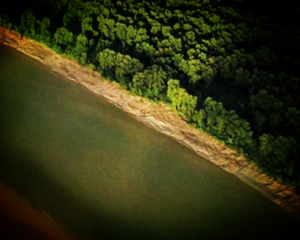What will change, as they come to understand that they do have them here? We can't be sure.
等到他們終于了解這里確實有這種樹的時候,會有什么變化?我們不確定。
Our job right now is simply to listen and learn, and what we are hearing -- along with the worry -- is resilience.
此刻我們的工作就是傾聽和學習,而我們聽到的除了擔憂,還有韌性。
I like to imagine a future in which mangroves help Bailique adapt: the relabeled forests attracting new government resources, perhaps, or a role in some future Brazilian carbon-exchange agreement.
我喜歡想像貝利克靠著紅樹林而調整適應的未來:可能是重新辨識出的森林帶來新的政府資源,或是未來在巴西的某些碳交換協議中扮演某個角色。
The mangroves will spread as turbulent forces of water keep rearranging river-mouth soil; eventually, I think, these protective trees will be growing within and alongside villages.
當水流的擾動力量不斷重新分布河口的土壤時,紅樹林也會跟著傳播;我認為到了最后,這些具備保護力量的樹林會在村子里面生長,也會沿著村子生長。
More roots holding back erosion, that is, in places where the mangroves do settle in. And more underwater nurseries for crabs and fish.
在紅樹林真的落地生根的地方,將會有更多根系防止土壤侵蝕,水下也會有更多給螃蟹和魚類的育幼場。
When I say that I hope we researchers can offer information and support, as the archipelago's people learn to make use of the mangroves' presence, I want to be clear: There's no panacea here.
我希望在群島居民學習如何利用紅樹林的存在時,研究人員可以提供信息和支持,但這樣說的同時我也要聲明:沒有萬靈丹。
Human-accelerated disruption is the most urgent threat imaginable not just in Bailique but across all of Amazonia and beyond.
因為人類而加速的破壞是我們能想到最迫切的威脅,不只是在貝利克,而是在整個亞馬遜流域和其他地方。

It's worth remembering, however, that water and weather have always been natural disrupters at the river mouth, this giant place of Amazon-Atlantic exchange, and that the wisest people on the islands know it.
不過,值得記住的是,在河口地區、也就是亞馬遜河和大西洋交接的巨大區域,水和氣候向來都是天然擾動因素,島上最明智的居民也都知道。
Felipe and I were in Chico's boat one day, heading into a channel toward our next village, when suddenly the boat stopped moving.
有一天,費利佩和我搭著奇柯的船駛進一條水道,要前往下一個村子時,船突然間就不動了。
Chico sighed. He didn't even look surprised. Then he jumped over the side, landed on his feet, and waded around back to push.
奇柯嘆了口氣,他看起來一點也不驚訝。然后他跳下船,涉水到船后方開始推。
Felipe and me: Wait, what? Chico: I missed the timing. Just barely, he said.
費利佩和我:等等,這是怎么了?奇柯:我錯過時機了。就差一點點,他說。
This channel now fills and drains so fast that if your boat does not enter it at exactly the right window, you're stuck in watery grass.
這條水道現在漲落超快,如果船沒有在準確的時機開進來,就會卡在水草里。
He'd learned the day's times from what people here call the fishermen channel, the daily conversation among Bailique boatmen -- shouted, usually, boat to boat across the top of the plume.
他是從當地人所謂的“漁民頻道”得知當日時機的,漁民頻道指的是貝利克船夫們的日常交談,通常是在羽流上從一艘船對著另一艘船大喊進行。
But he'd gotten the times wrong. Or the Amazon had defied prediction, behaving even in this narrow archipelago passage as the most powerful river in the world.
但他弄錯時間了。又或是亞馬遜河不想讓人預測,就算在這條狹窄的群島水道中,還是展現出全世界最威猛大河的行為。
Felipe and I climbed over the side too, into warm water up to our ankles.
費利佩和我也爬下船,踏入深及腳踝的溫暖河水中。
Mudou a agua, mudou a vida, I thought, and Chico nodded at us: Just keep pushing.
Mudou a agua, mudou a vida,我心想,而奇柯對我們點點頭:繼續推就對了。












